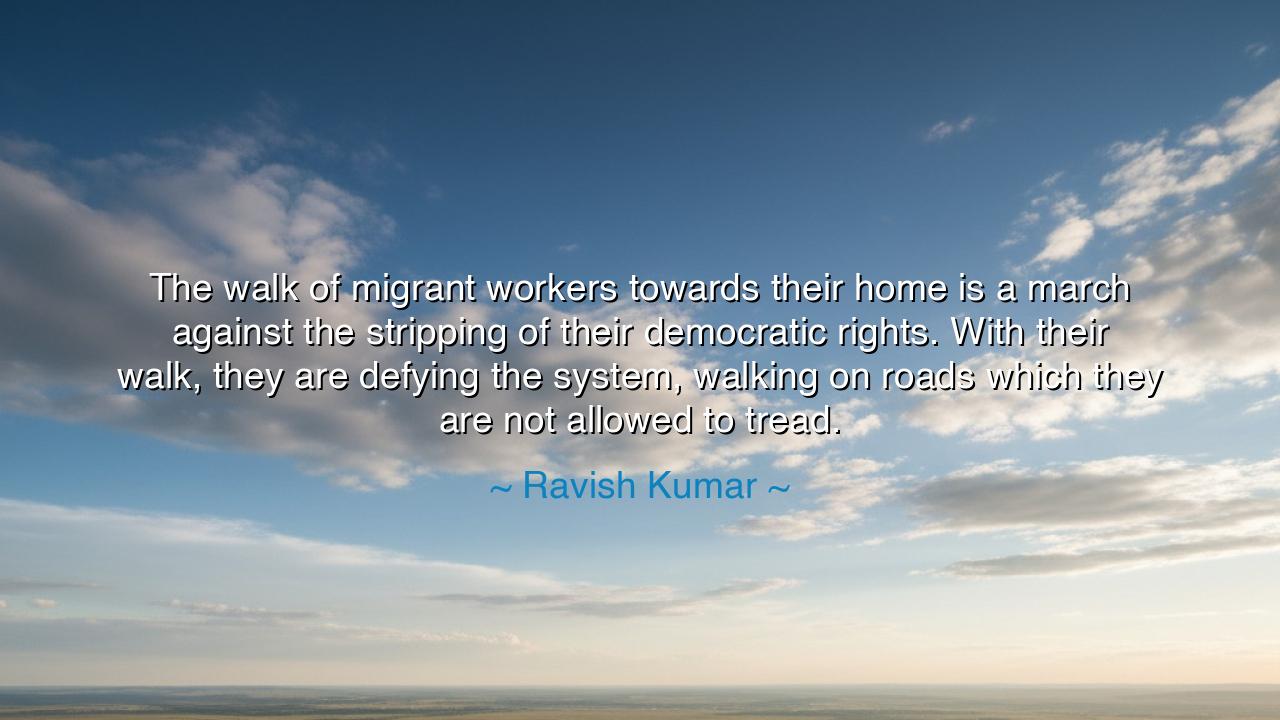
The walk of migrant workers towards their home is a march against
The walk of migrant workers towards their home is a march against the stripping of their democratic rights. With their walk, they are defying the system, walking on roads which they are not allowed to tread.






In the words of Ravish Kumar, a voice of conscience in our age of noise and neglect, there rings a cry both mournful and defiant: “The walk of migrant workers towards their home is a march against the stripping of their democratic rights. With their walk, they are defying the system, walking on roads which they are not allowed to tread.” These words, born of India’s long night during the great exodus of 2020, carry the power of scripture. They do not describe a simple act of travel, but a pilgrimage of suffering, a movement of bodies and souls against injustice itself. It was not merely a walk home—it was a march of dignity, a journey that exposed the deep fractures of society, where those who build the cities are forbidden to belong to them.
In those dark months, when the world locked its doors and borders, millions of migrant workers—men, women, and children—set forth on foot beneath the burning sun, carrying their few possessions, their hunger, and their hope. Stripped of work, money, and shelter, they began to walk hundreds of miles toward the villages of their birth. The trains had stopped. The factories had fallen silent. Yet the human will moved on, step by step, on blistered feet. Ravish Kumar saw in this movement not just despair, but resistance—for in walking, they claimed what the system had denied them: the right to exist, to return, to be human in a nation that had reduced them to shadows.
The ancients would have called such a march an act of dharma—the moral duty of survival against injustice. In the Mahabharata, when the exiled Pandavas walked barefoot through the wilderness, their journey was not merely punishment but purification. They were stripped of wealth and status, yet through their walk, they reclaimed the strength of their spirit. So too did the migrant workers, in their countless steps, bear witness to the truth that dignity cannot be legislated away. Every foot that struck the road was an act of defiance against the machinery that treated them as disposable. In walking home, they reminded the world that freedom is not granted by power—it is claimed through endurance.
Ravish Kumar’s words also expose the irony of modern civilization—that those who build its towers cannot live within them, that those who feed its cities are left hungry. Their journey was “on roads they were not allowed to tread,” because these roads, built by their labor, had been claimed by privilege. Yet, when the system failed them, they reclaimed these very roads with their steps, as ancient pilgrims reclaim sacred paths. Their march was a silent revolution, unarmed yet unstoppable, a movement without slogans yet full of meaning. Theirs was not a protest shouted through microphones, but a protest carved into the dust by bleeding feet.
History, too, bears witness to such walks. When Mahatma Gandhi led the Salt March in 1930, it was not only against the British tax—it was a reclaiming of agency, a declaration that even the poorest Indian could resist empire by walking. When the civil rights marchers of America crossed the bridge at Selma in 1965, they too defied a system that forbade them to tread freely upon their own land. In each of these movements, the simple act of walking became a symbol of awakening—proof that the body itself can be a banner of resistance, that when speech is silenced, footsteps can still speak.
The meaning of Ravish Kumar’s quote lies in this same eternal truth: the oppressed, by merely moving forward, unmask the hypocrisy of power. The system that denies them rights collapses under the sight of their perseverance. The roads they walk become sacred again—not as symbols of state control, but of human courage. Every weary step becomes a prayer, every blister a testament. They do not march for conquest, but for belonging—for the right to return home, to be counted among those whose labor sustains the nation yet whose faces are forgotten by it.
The lesson is clear and timeless: justice is not upheld by institutions alone—it is kept alive by the courage of those who refuse to surrender their humanity. When the world turns its back, the humble act of walking becomes resistance; the path itself becomes truth. To honor those who walked, we must first see them, not as statistics or victims, but as citizens of equal worth. Their march calls upon each of us to question our own comfort, our silence, our complicity.
So, dear listener, remember this: when the powerful deny the powerless their dignity, even a single step toward home becomes a revolution. Let us learn from the migrant workers, who, in the stillness of despair, chose motion; who, when stripped of all rights, chose to walk for them. For as Ravish Kumar teaches us, the true test of democracy is not in the speeches of its leaders, but in the footsteps of its forgotten—those who walk, not in hope of victory, but in defense of their human right to exist.






AAdministratorAdministrator
Welcome, honored guests. Please leave a comment, we will respond soon